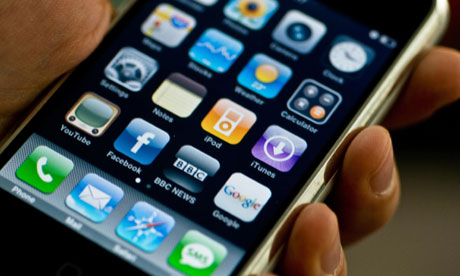Britons' appetite for Facebook and social networks on the go is driving a huge demand for smartphones – with 60% of teenagers describing themselves as "highly addicted" to their device – according to new research by the media regulator, Ofcom.
Almost half of teenagers and more than a quarter of adults now own a smartphone, with most using their iPhone or BlackBerry to browse Facebook and email.
The study, published on Thursday, also shows that smartphones have begun to intrude on our most private moments, with 47% of teenagers admitting to using their device in the toilet. Only 22% of adults confessed to the same habit. Unsurprisingly, mobile-addicted teens are more likely than adults to be distracted by their phones over dinner and in the cinema – and more would answer their phone if it woke them up.
Separate figures shared exclusively with the Guardian show that, for the first time, smartphone sales outstripped sales of regular mobiles in the first half of this year as the enormous demand continues to rise. Just over half of the total 13.6m mobile sales from January to June 2011 were smartphones, according to research by GfK Retail and Technology UK.
Of the new generation of smartphone users, 60% of teenagers classed themselves as "highly addicted" to their device, compared to 37% of adults.
Ofcom surveyed 2,073 adults and 521 children and teenagers in March this year. The regulator defines teenagers as aged between 12 and 15, with adults 16-years-old and above.
"Ofcom's report shows the influence that communications technology now has on our daily lives, and on the way we behave and communicate with each other," said James Thickett, Ofcom's director of research.
"Our research into the use of smartphones, in particular, reveals how quickly people become reliant on new technology – to the point of feeling addicted. As more and more people acquire smartphones, they are becoming an essential tool in peoples' social lives whether they are out with friends socialising or using Facebook on the move."
Facebook remains far and away the most popular website for mobile users, with users spending almost four times the amount of time socialising online than using Google or any other website. Unsurprisingly, multi-tasking teenagers said they were less likely to read books if they owned a smartphone. But they also said that owning a smartphone made them more likely to ditch games consoles like the PS3 and the computer, in favour of their pocket-sized handset.
The huge boost in smartphone sales has led to a 67% increase in mobile data use as phone users watched videos and sent emails on the go. Mobile operators, such as O2 and Vodafone, have been put under huge strain by the new load. But Thickett said the carriers are coping with the enormous demand.
"The research is saying that people are keeping their phones on longer and becoming addicted to them. This isn't a problem now but something we need to be aware of. Operators have responded by upgrading their networks so it is being coped with," Thickett said.
Despite being a nation of mobile addicts, Ofcom found that truisms still apply when it comes to traditional media like TV and radio. Other findings show:
• Britons are spending more time in front of the TV (four hours a day last year, compared to 3.8 hours in 2009). This is partly due to the rise of on-demand viewing, most notably Sky+, and an increase in the number of homes with high-definition TVs. Two newcomers to the HD market, Freeview HD and Freesat HD, have established themselves as more-affordable competitors to Virgin Media and Sky.
• The new generation of broadband, delivered by fibre-optic cables, is now available for 57% of UK households – though just 500,000 have adopted it. Four in five of those with superfast broadband said they were satisfied with the service, compared to 57% satisfaction with their previous broadband.
• Aside from offline gaming, Brits who own games consoles are most likely to use it for watching video content (22%), online gaming (22%), and watching DVDs (19%). Just over one in 10 said they browse the web via their games console, while 9% use it to watch BBC iPlayer.
• Britons sent an average of five text messages a day last year, contributing to a total of 129bn texts sent – up by 24% in 2009.
• Nearly 10m TV sets were sold in 2010, almost all of which were HD ready. The rise of internet-enabled TVs continued, with 1m sales last year, and 3D living room viewing remained a marginal activity, with 125,000 sales of 3D TVs.
However, Ofcom warned that older Britons risked being left behind in the "digital revolution". While 90% of adults aged 35-44 have the internet at home, this falls to just a quarter of over 75s. The survey showed that 51% of over 75s own a mobile phone, compared to 99% of 25-34-year-olds. Ofcom said that, for the first time, more than half of 65- to 74-year-olds have access to the internet at home, while just over three quarters own a mobile phone.
Source : guardian
Almost half of teenagers and more than a quarter of adults now own a smartphone, with most using their iPhone or BlackBerry to browse Facebook and email.
The study, published on Thursday, also shows that smartphones have begun to intrude on our most private moments, with 47% of teenagers admitting to using their device in the toilet. Only 22% of adults confessed to the same habit. Unsurprisingly, mobile-addicted teens are more likely than adults to be distracted by their phones over dinner and in the cinema – and more would answer their phone if it woke them up.
Separate figures shared exclusively with the Guardian show that, for the first time, smartphone sales outstripped sales of regular mobiles in the first half of this year as the enormous demand continues to rise. Just over half of the total 13.6m mobile sales from January to June 2011 were smartphones, according to research by GfK Retail and Technology UK.
Of the new generation of smartphone users, 60% of teenagers classed themselves as "highly addicted" to their device, compared to 37% of adults.
Ofcom surveyed 2,073 adults and 521 children and teenagers in March this year. The regulator defines teenagers as aged between 12 and 15, with adults 16-years-old and above.
"Ofcom's report shows the influence that communications technology now has on our daily lives, and on the way we behave and communicate with each other," said James Thickett, Ofcom's director of research.
"Our research into the use of smartphones, in particular, reveals how quickly people become reliant on new technology – to the point of feeling addicted. As more and more people acquire smartphones, they are becoming an essential tool in peoples' social lives whether they are out with friends socialising or using Facebook on the move."
Facebook remains far and away the most popular website for mobile users, with users spending almost four times the amount of time socialising online than using Google or any other website. Unsurprisingly, multi-tasking teenagers said they were less likely to read books if they owned a smartphone. But they also said that owning a smartphone made them more likely to ditch games consoles like the PS3 and the computer, in favour of their pocket-sized handset.
The huge boost in smartphone sales has led to a 67% increase in mobile data use as phone users watched videos and sent emails on the go. Mobile operators, such as O2 and Vodafone, have been put under huge strain by the new load. But Thickett said the carriers are coping with the enormous demand.
"The research is saying that people are keeping their phones on longer and becoming addicted to them. This isn't a problem now but something we need to be aware of. Operators have responded by upgrading their networks so it is being coped with," Thickett said.
Despite being a nation of mobile addicts, Ofcom found that truisms still apply when it comes to traditional media like TV and radio. Other findings show:
• Britons are spending more time in front of the TV (four hours a day last year, compared to 3.8 hours in 2009). This is partly due to the rise of on-demand viewing, most notably Sky+, and an increase in the number of homes with high-definition TVs. Two newcomers to the HD market, Freeview HD and Freesat HD, have established themselves as more-affordable competitors to Virgin Media and Sky.
• The new generation of broadband, delivered by fibre-optic cables, is now available for 57% of UK households – though just 500,000 have adopted it. Four in five of those with superfast broadband said they were satisfied with the service, compared to 57% satisfaction with their previous broadband.
• Aside from offline gaming, Brits who own games consoles are most likely to use it for watching video content (22%), online gaming (22%), and watching DVDs (19%). Just over one in 10 said they browse the web via their games console, while 9% use it to watch BBC iPlayer.
• Britons sent an average of five text messages a day last year, contributing to a total of 129bn texts sent – up by 24% in 2009.
• Nearly 10m TV sets were sold in 2010, almost all of which were HD ready. The rise of internet-enabled TVs continued, with 1m sales last year, and 3D living room viewing remained a marginal activity, with 125,000 sales of 3D TVs.
However, Ofcom warned that older Britons risked being left behind in the "digital revolution". While 90% of adults aged 35-44 have the internet at home, this falls to just a quarter of over 75s. The survey showed that 51% of over 75s own a mobile phone, compared to 99% of 25-34-year-olds. Ofcom said that, for the first time, more than half of 65- to 74-year-olds have access to the internet at home, while just over three quarters own a mobile phone.
Source : guardian

















